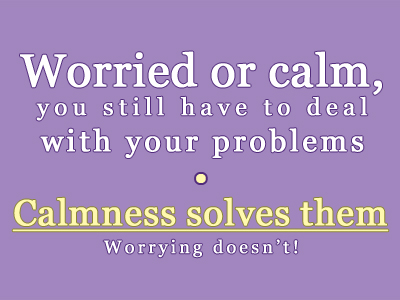Worries, stress, anxiety, even panic, they are all beneficial to a certain extent, but after that limit (which is fairly low), they can (and will) make you sick. They signal malfunctions and/or threats to your well-being. They should be seen as symptoms, symptoms that go away naturally once you address their underlying causes.
Let me first tell you what happened to me a few hours ago.
I had a different post planned for today, but this morning, after a series of agitating dreams, I woke up feeling sick. The light early dinner I had last night could not explain my indigestion, plus, symptoms should have appeared sooner if my small bowl of homemade vegetable soup was the cause my digestive system went wild. However, I immediately knew the cause. A much worse similar experience convinced me years ago that stress, especially coupled with exhaustion, can make you unforgettably sick, put you in bed for a couple of days, so that when you’re up on your feet again, you start taking care of yourself. For years, I made sure I was at least getting proper rest, enough to cope with imminent stress.
However, lately, I’ve been under heavy stress; the last few weeks have been increasingly worrying due to postponements over which I had no control, and I let my sleep pattern become a mess. Now, I dislike complaining. Usually, if you ask me how I am, I say I’m fine, or, if I give a hint about something bothering me, I quickly turn it into a joke. Good setting for stress build-up, especially since I don’t vent as much or as often as I need to. I usually manage this well, but this morning I just reached a limit… and, by pushing me to solve my problems, it inspired me to share a few practical ideas for times when you feel trapped in panic and worries. They work for me and those who trust my advice, so maybe they will work for you too.

I believe that the way we’re brought up – our emotional education and background – influences the way we respond to life later on. This includes responses such as worrying, anxiety, panic, or despair. Remember that these feelings always have a (bigger or smaller) dose of untruthfulness. They are not proportional to general reality, but they do make your own reality. The imbalance is obvious, and frequently it simply needs a pump of fresh logic to restore your calm. When one panics, exaggeration steps in – there is no light, no hope, no answer, no solution, you’re doomed, trapped, suffocated. You’re never truly that way, but that is what you believe and feel. Thankfully, beliefs are not impossible to change. But until you change them, how do you cope with the feelings?
Let’s assume you’re very worried and anxious. You’re afraid and panicking. You feel you’ve lost all control and you cannot do anything about your stress. There is a lot of impractical advice on this topic, so you’d better not trust everything you read. Don’t let yourself set up for disappointment, feeling like there’s something terribly wrong with you if those popular “remedies” don’t work. First of all remember that, when you feel out of control, nothing will make you feel better than taking control. And it is totally achievable.
A pen and a notepad will come in handy.
1. Find or create a space (no matter how small) of comfort, quietness, security. Turn off phones, TV sets, radios. Pay attention to your breath and slow it down voluntarily. Notice any motor restlessness and stop it. Because you want to. Because you choose so. Because you ARE in control! At first, the calm will be artificial. But exercise control over yourself, and it will make you feel better, more powerful, more able to make a change to your situation. Don’t trick yourself into calm. Make it very clear that you are calming yourself, that you choose and are able to do so.
2. Acknowledge your sensations, pay attention to what you feel, think and how your body acts. No need to do anything about it. Just let it be as it is.
3. List your problems, find out what exactly bothers you. Then, take each problem and observe how thinking of it makes you feel. Does it cause you anger, or panic, or an instant headache? Observe the link between the problem and your immediate response.
4. For each problem (at a time), think of possible solutions you CAN put into practice. Don’t worry if you come with silly ideas or no ideas at all. Hang on in there and demand of yourself practical thoughts. Do not allow your thinking process to be influenced by anything else than your desire to become calm, focused and in control of your self. You can do it. Even “giving up” is a solution sometimes, so you can list that too if it can end a disturbing situation.
5. If there’s absolutely nothing you can do, just acknowledge that and let it go for a while. Do a little something you enjoy – something that requires movement, like walking. Daydream of things that could make you feel better. You don’t have to do anything just yet. Prepare the calmness you need in order to make a change a bit later.
Tell yourself: “I can handle this. I can handle myself. I’m the only one who’s truly in charge of me. I have control.” Because, no matter what your reckless emotions are tricking yourself into thinking, you truly are in control over your whole being – body, mind and soul.
